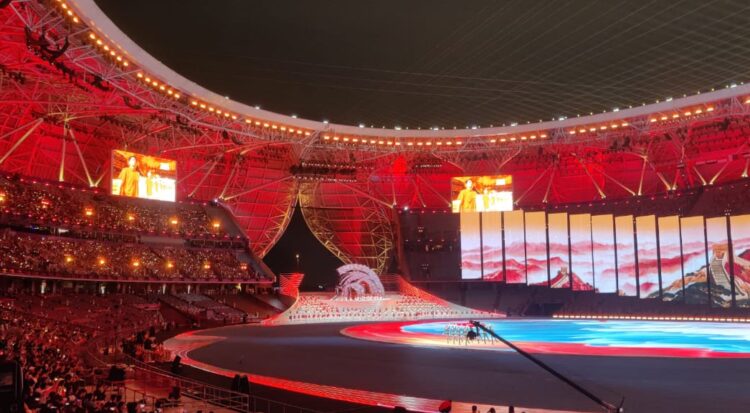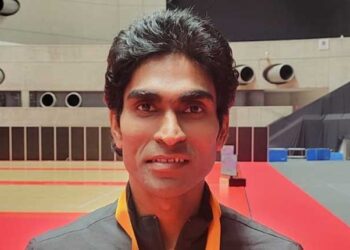Hangzhou: With a theme based on water and tide, which are integral parts of city life here and promoting principles of simplicity, sustainability and cost-effectiveness, Hangzhou displayed before the guests from across the continent a spectacular opening ceremony that blended the power of technology and beauty of art and captured the distinctive Chinese cultural heritage.
The 90-minute-long programme captured China’s cultural heritage and romantic imagery through the melding of its thousands-of-years-old civilisation and modern technology through stunning visuals, showcasing the dedicated efforts of the Chinese path to modernisation. It was a presentation that combined Eastern aesthetics and a viewpoint that can connect with a global audience and expresses the country’s goodwill and aim of building a community with a shared future through an interplay of Chinese style and Asian appeal.
Water and tide were the abiding themes of the opening ceremony representing the surging tides of Asia, presenting different themes of “water” in its different forms — mist, fog, West Lake, Qiantang Tidal Bores and the thousand-year-old Beijing-Hangzhou Grand Canal and the water conservation system of the Archeological ruins of Liangzhu City — which are found in and around Hangzhou to bring out the connection between life and environment.
While expressing continuity, creativity and the inclusive nature of culture, the opening ceremony presented beautiful scenes that embody the uniquely Chinese approach to achieving modernisation by showing the happy lives of the Chinese people and showcasing China’s innovative technologies through the integration of the virtual and real worlds, in today’s era of Artificial Intelligence; and depicting the progress made by all Asian countries and regions, made possible by appreciating other cultures, and promoting the goal of shared prosperity.
Chinese President Xi Jinping declared the games open in the presence of Randhir Singh, acting president of the Olympic Council of Asia, President of the International Olympic Committee, Thomas Bach and other dignitaries.
Held at the Hangzhou Olympic Sports Centre Stadium, which the locals fondly refer to as the ‘Big Lotus’ as it is formed by 28 large and 27 smaller ‘lotus
petals’, the ceremony presented the distinctive motifs of the Chinese culture and life in Hangzhou, which has the undulating waters of the Qiantangjiang
River and the allure of Hangzhou silk as the backdrop.
With songs by some of the contemporary Chinese musicians and dance themed around culture and fitness, blue was the abiding colour and texture of the ceremony as it symbolises water, which the locals say is the heart and soul of Hangzhou.
The athletes’ marchpast was led by the contingent of Bahrain leading the nations’ marchpast with Bhutan and Brunei Darussalam following in that order.
The Indian Contingent resplended in their golden-tinged ceremonial livery walked out in the eighth position in a marchpast that took each contingent outside the stadium within minutes, unlike other previous ceremonies that allowed the athletes to stay in the stadium for the pledge and lighting of the cauldron and have fun listening to the music and dancing to the beat.
Though the contingent includes 921 members including 625 sportspersons 260 coaches and other support staff, only 200 of them participated in the ceremony as many sportspersons had events on Sunday.
(IANS)
















